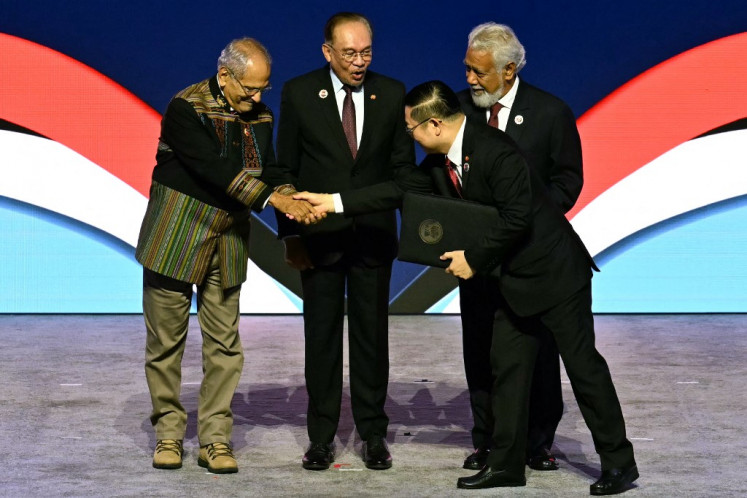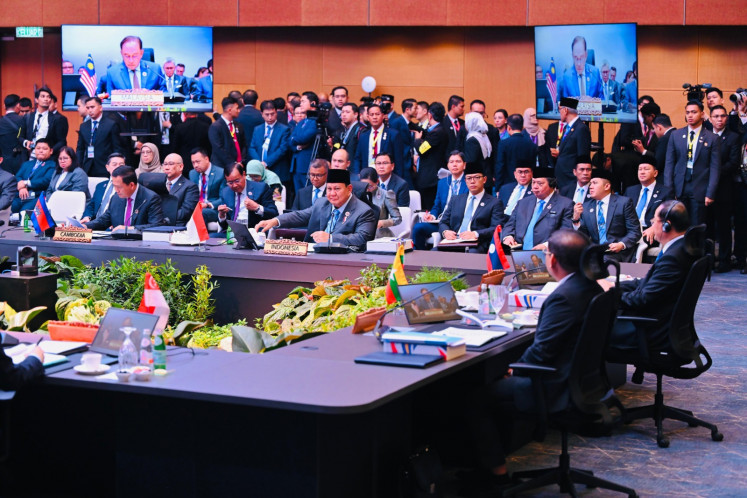Popular Reads
Top Results
Can't find what you're looking for?
View all search resultsPopular Reads
Top Results
Can't find what you're looking for?
View all search resultsWomen legislators 'must win public’s trust, avoid corruption'
The women politicians that will sit in the House of Representatives for the 2019-2024 term need to demonstrate good performance and avoid corrupt practices, otherwise voters will lose trust in them, a minister and a legislator have said
Change text size
Gift Premium Articles
to Anyone
T
he women politicians that will sit in the House of Representatives for the 2019-2024 term need to demonstrate good performance and avoid corrupt practices, otherwise voters will lose trust in them, a minister and a legislator have said.
It is hoped that voters’ trust in women legislators will lead to more women being elected in future elections and eventually help increase women’s representation in legislative bodies.
“I encourage women in the House and legislative councils to practice good governance. In the first place, becoming a representative or a councilor is already difficult for some of us [women], so let’s not tarnish the reputation you’ve built by committing graft,” Women’s Empowerment and Child Protection Minister Yohana Yembise said at a workshop on women’s representation in Jakarta recently.
Likewise, regional representative council member Hemas, who is also the wife of Yogyakarta Governor Hamengkubuwono, suggested that women lawmakers, especially those who will serve in the 2019-2024 term, must create a five-year plan and list down their goals immediately at the beginning of their term.
“Women representatives must be braver to speak up to the media. The only ones who can bring changes that support gender equality and women’s rights are the women lawmakers themselves,” said Hemas recently.
Both Yohana and Hemas spoke at a workshop and discussion on women’s representation in politics.
Data from the results of April’s legislative election shows that women’s representation in the House for the 2019-2024 term increased compared to the 2014-2019 term.
Despite the increase in the number of women lawmakers, it is still below the target set by the Women’s Empowerment and Child Protection Ministry of 30 percent of the total number of legislators in the House.
Out of 575 politicians elected to the House for the 2019-2024 term, 458 (or 80 percent) are men and 117 are women. In comparison, out of 560 lawmakers for the 2014-2019 term, 463 (83 percent) were men and 97 were women.
Despite the relatively small number, women’s representation in the House actually increased by 3 percent during April’s election.
Yohana, however, still expressed her dissatisfaction following the failure to meet the ministry’s target to have at least 30 percent women in both the House and the regional legislative councils.
“The 20 percent women’s representation in the House that resulted from this year’s election is a sign that women in Indonesia have started to realize the importance of having more women representatives in the legislature who will fight for women’s rights,” she said.
“However, we are still somewhat far from the 30 percent target and thus there is still plenty to be done and improvement to be made,” said Yohana during a press conference on women’s involvement in politics in West Jakarta earlier this month.
According to her, there had been a tendency in previous legislative elections for women voters to prefer voting for men instead of women.
“One of the biggest challenges to increasing the percentage of women’s representation in the House and legislative councils was the preference of women voters to vote against candidates of their own gender,” the minister said.
Furthermore, the ministry also heard cases where women who were interested in becoming legislative candidates had their dreams buried by their husbands who assumed their spouses were not competent enough to become politicians.
In addition, women legislators must equip themselves with knowledge and the ability to argue for their ideas.
“Since our representation [women] at both the House and legislative council levels is still relatively small, we must be prepared and ready with a list of arguments on why our ideas matter and should be considered to be passed as a bill,” said Hemas recently.
During the seminar, Yohana also called on legislators to give more attention to issues related to women’s rights and women’s health services.
As an example, Yohana mentioned the deliberation of the controversial sexual violence bill. She said she had urged House Commission VIII chairman and National Mandate Party (PAN) lawmaker Ali Taher, who was present at the seminar, to pass the long-awaited sexual violence bill into law in the coming weeks as the new House members would take over the responsibility next month.
“I ask Pak Ali to urge the policymakers in Commission VIII to finalize the approval of the sexual violence bill. If the bill does not get passed by the end of the current House term, we will start everything again from zero,” she said
In response, Ali claimed that his commission was constantly discussing the bill during plenary sessions. Furthermore, he claimed that one of the biggest hurdles to getting the bill approved was the fact that some factions did not agree with the current name of the bill.
“A number of factions want to change the sexual violence bill’s name into the guidance, supervision and household welfare bill. We are still discussing the title, substance and content of the bill as of now,” said Ali.
When asked if the bill could be passed before the end of the month, Ali expressed optimism.
“We are quite certain the bill could be approved during our term. However, a few modifications to the bill might be necessary. As of now, I cannot guarantee 100 percent that the bill will be approved by the end of the month.”
Meanwhile, a number of women House members also shared the same objective as minister Yohana.
“The other women lawmakers and I are currently pushing for the sexual violence bill to be passed before the end of our working term. However, many of the male members have not prioritized this bill as much as us, instead prioritizing other bills that benefit their parties more,” NasDem Party lawmaker Irma Suryani Chaniago told The Jakarta Post on Tuesday.
Gerinda Party lawmaker Rahayu Saraswati also said that her party supported the approval of the sexual violence bill.
“We are actively urging the other lawmakers to realize the importance of the sexual violence bill to reducing sexual harassment cases in the future. Hopefully, it can be passed before the end of our term,” Rahayu told the Post on Tuesday.
Rahayu also claimed she had heard rumors that some male policymakers were of the opinion that the 30 percent quota for women representatives in the House and legislative councils was sufficient and should not be increased any further.
“Before the election, several male candidates even rejected the idea that a woman should be put on top of candidate list [during the election] because the idea was deemed disadvantageous to male candidates,” said Rahayu. (bry)










